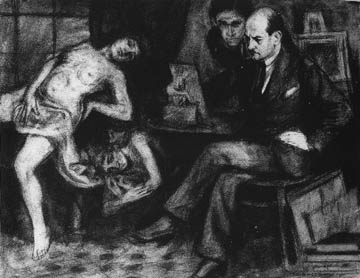The film winds towards its dismal end, and it becomes clear that the past is prologue. In the discussion following, Jerzy Jarzebski of the Jagiellonian University, Krakow, a scholar of Schulz, enthuses about how the writer loved Nietzsche, Rilke, and a number of other German writers and philosophers. His life belonged to Europe. Only in the manner of his death was he a Jew. Read: there is a special, humiliating, passive Jewish Way of Death. And as to the German language, of course Schulz is well translated into that language - and, as someone tautly observes, very badly and crudely into Hebrew. The latter language by its very unformed newness, its vitality, desecrates him. Crudity, vulgarity - force - are the leitmotif of the musclebound Israel whose demonic dimensions are limned gradually through the discussion. Art produced as virtual slave labor must not be discussed as politics - there, the moderator of the discussion insists on sticking to questions of art, as if Schulz were no different from Michelangelo.
 Only with respect to Israel does politics intrude, while the saintly Benjamin Geissler seeks to restore to the humane and disinterested states of Poland and the Ukraine their lost Jewish heritage, about which there is to be "dialogue".
Only with respect to Israel does politics intrude, while the saintly Benjamin Geissler seeks to restore to the humane and disinterested states of Poland and the Ukraine their lost Jewish heritage, about which there is to be "dialogue".
A woman with a short, severely trimmed casque of black hair and a tense, angry expression, speaks up, enraged. The Russian friends I'm with tell me she is a Visiting Scholar from Syria at Harvard's Center for Middle East Studies who goes to lots of these events. How can you talk about a past holocaust, she protests, while ignoring the present Israeli holocaust against the Palestinian people? "Aw, Jesus Christ!" I yell. The audience look at me with annoyance. The moderator glances briefly at me with a pleading smile, so I shut up. Geissler nods understandingly, and says that is just what he wants: dialogue. Dialogue between Europeans and Jews, between Israelis and Palestinians. You wouldn't believe the kind of opposition and hostility I've faced, he complains. But I'm determined, he says, to break the taboos that have constrained Germans for so long.
At last I get it. The whole point of the film is utilize the affair of the Schulz frescoes in the service of what has been called "the new anti-Semitism" (or, by Pierre-Andre Taguieff, "judeophobia" - see related article) in Europe: to shift the mantle of humanism from the shtetl Jews onto the new Germans and to transfer the stigma of violence from the Nazis to the Israelis. Usually the Israelis are cast as the new Nazis because of their supposed mistreatment of the Palestinians. But here is a new motif, more elegant, and more insidious: to present Israel as the crude vandal pillaging Schulz's delicate paintings and thereby persecuting the Jews themselves! A German film director exposing the crime then can become the suffering Jew himself. It is a brilliant tactic, enabling Germany to become the accuser (the satan, the diabolos) once again, righteous and guilt-free.
When Geissler says he is a pioneer in breaking taboos, he is too modest about his countrymen's efforts. Simon Wiesenthal noted nearly fifteen years ago in his memoirs that it was already commonplace for young Germans to equate Israel with the Nazis over the Palestinian issue, thereby exculpating themselves. German leftists who helped Arab terrorists hijack a plane in the 1970's separated the Jewish passengers from the others: they had overcome their taboos quite successfully, one might say. One begins to wonder what taboos there were, in fact. As the Chinese say, It's hard to find a black cat in a dark room, especially if there's no cat there. Prof. Joseph Dan writes in an essay in the journal Azure that the early Christians arrogated to themselves the Biblical charisma, the cosmic kingship, and even the very name of Israel. Germany is steeped in Christian tradition and in a tortured nationalism as well; why not repeat the Catholic ploy, mutatis mutandis, and try for David's crown itself? And if the role reversal makes history, especially recent history, magically dissolve, so much the better.
So this was the debate at Harvard: not whether Geissler's film was, in decrying a supposed act of vandalism, itself vandalizing Yad Vashem, Israel, and the operation of Jewish memory - but whether it didn't go far enough.
Our Syrian colleague stoutly persisted: when Geisseler mentioned his film had not been shown at an Israeli festival, she took up the tune. Of course not- said she- and how could it, when the shot of Jerusalem with the muezzin's call plainly shows that matters of Polish and Ukrainian history have been foisted upon someone else's land? Again, the audience sit in quiet agreement. "Polish and Ukrainian": not Jewish. "Someone else's": Jews have no association whatsoever with Jerusalem or anywhere else in the land of Israel. As Amos Oz put it recently, they used to tell the Jews not to be in Europe, but to go to Palestine. Now that the Jews are in Palestine, they are told not to be there. The message is: Don't be. There's no space for Jews in Drohobycz and none in Palestine.



Harvard Death Fugue
On the Exploitation of Bruno Schulz
James Russell
The Jews of Istanbul
Sara Liss
The Truth about the Rosenbergs
Joel Stanley
Thinking despite Doubt, Feeling despite Truth
Jay Michaelson
Two Rituals
Joshua Bolton
Hepster Advice
Jennifer Blowdryer
Josh Goes to the Hospital
Josh Ring
Archive
Our 400 Back Pages
Saddies
David Stromberg
Zeek in Print
Winter 03 issue now on sale
About Zeek
Events
Contact Us
Links
From previous issues:
French Antisemitism
Michael Shurkin
The Red-Green Alliance
Dave Hyde
Koby Israelite
Matthue Roth